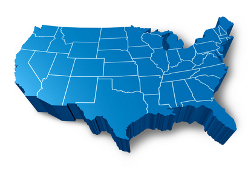 Auto insurance is commonplace: everyone needs it, most people have it, but not everyone talks about it. So it’s always a kick whenever the topic turns up in unlikely places.
Auto insurance is commonplace: everyone needs it, most people have it, but not everyone talks about it. So it’s always a kick whenever the topic turns up in unlikely places.
Check out our previous article on those unlikely places.
In this entry, we’ll review recent topics that’ll take you from San Diego to Washington, D.C., and beyond, with auto insurers and industry groups even making news overseas.
Video Games Might Help Your Driving—or Make It Much Worse
Australian financial firm Mozo posted an interesting article that touched on Grand Theft Auto 5, the video game bestseller covered in our last entry.
In its post, Mozo linked two studies, one from New York’s University of Rochester and the other from Continental Tyres, a company out of the U.K.
Both studies say that video-game playing correlates with driving reaction time, something that we know all too well.
Lead researcher Daphne Bavelier for the New York study explained what happens to a driver’s brain when posed the question: “brake or don’t brake”?
Bavelier’s explanation for a seemingly uncomplicated decision-making process was decidedly complicated: “The brain is always computing probabilities. As you drive, for instance, you may see a movement on your right, estimate whether you are on a collision course, and based on that probability make a binary decision: brake or don’t brake.”
Video games, according to the study, tune players’ reactions to a point so fine that they “make more correct decisions per unit time.”
Of course, there are chronically incorrect decision-makers out there too. A survey from Continental Tyres showed that video-gamers can be risk-takers not only on the screen, but off of it too.
“Playing computer driving games means good concentration levels and improved reaction times, however, they can take more risks than non-gaming drivers,” said Tim Bailey, a safety expert with Continental Tyres, who added that video-gamers who spent more than eight hours a day were three times more likely to get into a crash than those who played for less than an hour.
Bailey had a simple answer for why video-game players can become worse drivers: “Hubris.”
Hubris means, in short, arrogance. And that means, in short, video-gamers might try that wrong-way street because there is a “lack of real consequences in games,” Bailey said.
In real life, though, your safety and highers car insurance premiums are the consequence, and there’s no actual prize if you land that stunt jump.
A Trek with GEICO’s Camel on ‘Hump Day’
Caleb the Camel is one hoofer with staying power. Months after he debuted in GEICO’s TV commercial, tube-watchers and business analysts alike have been singing Caleb’s praises as a likable mascot with a grabbing catchphrase.
Caleb was so catchy that he caused a schoolwide ban in Connecticut, where middle-schoolers couldn’t stop repeating his “it’s hump day” mantra. The disruptions sparked a ban from plenty of annoyed teachers.
Parent Mick Ruggiero told a local TV station that he supported the new rule, especially when kids decided that repetitions of the “Hump Day” phrase can occur any day, any hour and anywhere.
“OK, that’s getting out of hand,” he said. “Just keep it to Wednesdays and we’ll be all right.”
And that’s exactly what Caleb did this week, keeping himself to Hump Day and making the most of it. In a media-tour trek across the U.S., GEICO hit nearly a dozen sites from San Diego to Washington D.C., giving away t-shirts and superimposed snapshots with Caleb the Camel/the Celebrity.
PCI Highlights Auto Safety on Capitol Hill’s Agenda
It isn’t exactly an unlikely place for auto insurance, but Capitol Hill got a heavy dose of industry talk about the future of auto safety with another installment of the “Capital Engagement Series” from the Property Casualty Insurers Association of America (PCI).
Panel speakers included Jeanette Hernandez, director of claims operations for State Auto and Nat Wienecke, a vice president with PCI.
Auto safety is even more crucial “as we approach the holidays [and] millions of people will be traveling,” Wienecke said at the panel (Check out our parts 1 and 2 of our series on what your car will need in the coming cold season).